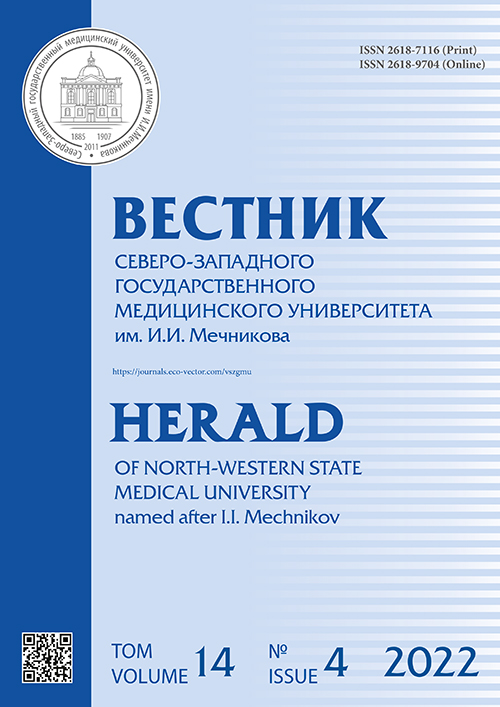Long term effects of de-escalation antimicrobial strategy in the burn unit
- 作者: Medvedev D.S.1, Bakulina N.V.2
-
隶属关系:
- City Pokrovskaya Hospital
- North-Western State Medical University named after I.I. Mechnikov
- 期: 卷 14, 编号 4 (2022)
- 页面: 71-81
- 栏目: Original study article
- ##submission.dateSubmitted##: 25.09.2022
- ##submission.dateAccepted##: 11.11.2022
- ##submission.datePublished##: 20.01.2023
- URL: https://journals.eco-vector.com/vszgmu/article/view/111045
- DOI: https://doi.org/10.17816/mechnikov111045
- ID: 111045
如何引用文章
详细
BACKGROUND: De-escalation strategy of antimicrobial therapy demonstrates favorable short-term results: it lowers the mortality and reduces the cost of treatment. The long-term results of applying this strategy in the burn unit had not been studied previously.
AIM: To compare the long-term results of the de-escalation approach to antimicrobial therapy on the microbial spectrum, resistance of the hospital microflora and consumption of antimicrobials in the burn unit.
MATERIALS AND METHODS: The study comprises the data from the burn unit of the Severstal hospital for 2006, 2012 and 2021: statistical data on mortality and the average duration of hospital stay; microbiological data on spectrum and resistance of bacteria to antimicrobials.
RESULTS: The use of the de-escalation strategy of antimicrobial therapy in the burn unit of the Healthcare Institution “Severstal” for 10 years has reduced mortality, length of stay, consumption of antimicrobials. De-escalation strategy has not significantly affect the spectrum of nosocomial microflora but has lowered the resistance of gram-positive microorganisms to antibiotics. There was a decrease in the drug resistance index for the main pathogens of infectious complications as a result of implementing the de-escalation strategy.
CONCLUSIONS: The implementation a de-escalation strategy of antimicrobial therapy requires conducting periodic microbiological monitoring for early correction of starting antimicrobial regimens.
全文:
作者简介
Denis Medvedev
City Pokrovskaya Hospital
编辑信件的主要联系方式.
Email: mds80@inbox.ru
ORCID iD: 0000-0002-1862-5418
SPIN 代码: 8723-8915
Researcher ID: F-6015-2014
俄罗斯联邦, Saint Petersburg
Natalia Bakulina
North-Western State Medical University named after I.I. Mechnikov
Email: natalya.bakulina@szgmu.ru
ORCID iD: 0000-0003-4075-4096
SPIN 代码: 9503-8950
Scopus 作者 ID: 7201739080
Researcher ID: N-7299-2014
MD, Dr. Sci. (Med.), Assistant Professor
俄罗斯联邦, Saint Petersburg参考
- Dyar OJ, Huttner B, Schouten J, et al. What is antimicrobial stewardship? Clin Microbiol Infect. 2017;23(11):793–798. doi: 10.1016/j.cmi.2017.08.026
- Timsit JF, Bassetti M, Cremer O, et al. Rationalizing antimicrobial therapy in the ICU: A narrative review. Intensive Care Med. 2019;45(2):172–189. doi: 10.1007/s00134-019-05520-5
- Marquet K, Liesenborgs A, Bergs J, et al. Incidence and outcome of inappropriate in-hospital empiric antibiotics for severe infection: A systematic review and meta-analysis. Crit Care. 2015;19(1):63. doi: 10.1186/s13054-015-0795-y
- Buckman SA, Turnbull IR, Mazuski JE. Empiric antibiotics for sepsis. Surg Infect (Larchmt). 2018;19(2):147–154. doi: 10.1089/sur.2017.282
- Saltoglu N, Surme S, Ezirmik E, et al. The effects of antimicrobial resistance and the compatibility of initial antibiotic treatment on clinical outcomes in patients with diabetic foot infection. Int J Low Extrem Wounds. 2021:153473462110041. doi: 10.1177/15347346211004141
- van den Bosch CM, Hulscher ME, Akkermans RP, et al. Appropriate antibiotic use reduces length of hospital stay. J Antimicrob Chemother. 2017;72(3):923–932. doi: 10.1093/jac/dkw469
- Zakharova NV, Medvedev DS. Decreasing of fatality rate and lowering of direct costs of treatment for using of de-escalation strategy to antibiotic therapy of infection due to thermal injury. Preventive and Clinical Medicine. 2012;4(45):42–45. (In Russ.)
- Zakharova NV, Medvedev DS. Pharmacoeconomics of escalation and de-escalation strategies to antibiotic therapy of infection due to thermal injury. Herald of North-Western State Medical University named after I.I. Mechnikov. 2013;5(1):73–76. (In Russ.)
- ATC/DDD index 2022 [Internet]. WHOCC. Available from: http://www.whocc.no/atc_ddd_index. Accessed: 21.09.2022.
- Analyze a 2x2 contingency table [Internet]. GraphPad by Dotmatics. Available from: https://www.graphpad.com/quickcalcs/contingency1. Accessed: 21.09.2022.
- Becker K, Heilmann C, Peters G. Coagulase-negative staphylococci. Clin Microbiol Rev. 2014;27(4):870–926. doi: 10.1128/cmr.00109-13
- Gisselø KL, Rubin IMC, Knudsen MS, et al. Substantial decrease in vancomycin-resistant Enterococcus faecium outbreak duration and number of patients during the Danish covid-19 lockdown: A prospective observational study. Microb Drug Resist. 2022;28(1):73–80. doi: 10.1089/mdr.2021.0040
- Kampmeier S, Tönnies H, Correa-Martinez CL, et al. A nosocomial cluster of vancomycin resistant enterococci among COVID-19 patients in an Intensive Care Unit. Antimicrob Resist Infect Control. 2020;9(1):154. doi: 10.1186/s13756-020-00820-8
- Clinical breakpoints — breakpoints and guidance, 2022 [Internet]. EUCAST. Available from: https://www.eucast.org/clinical_breakpoints. Accessed: 21.09.2022.
补充文件











